
Nicola Sturgeon has become the longest serving First Minister in Scotland since devolution.
The First Minister overtook her former mentor Alex Salmond on Wednesday, serving in the role for seven years, six months and five days.
Here are the key dates in the First Minister’s time in charge:
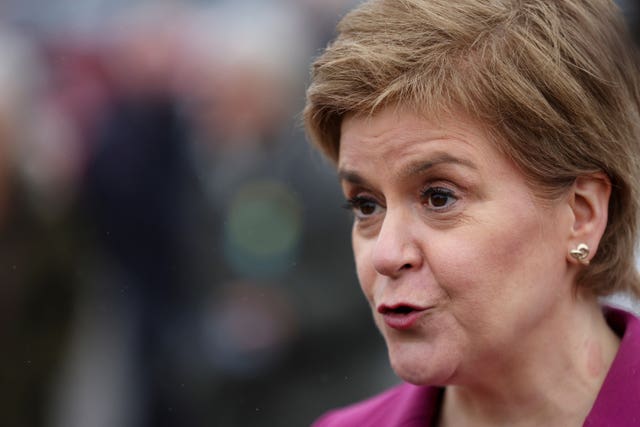
1992
– April 9
Ms Sturgeon first stands for election in the 1992 general election in the Glasgow Shettleston constituency, as the youngest candidate in the country at the time.
The 21-year-old fails to unseat Labour incumbent David Marshall, who won more than 60% of the vote, but comes second with 6,831 votes and increases the SNP vote by 6.4%
1999
– May 6
Nicola Sturgeon is elected as an MSP in the first Scottish parliamentary election, representing the Glasgow region.
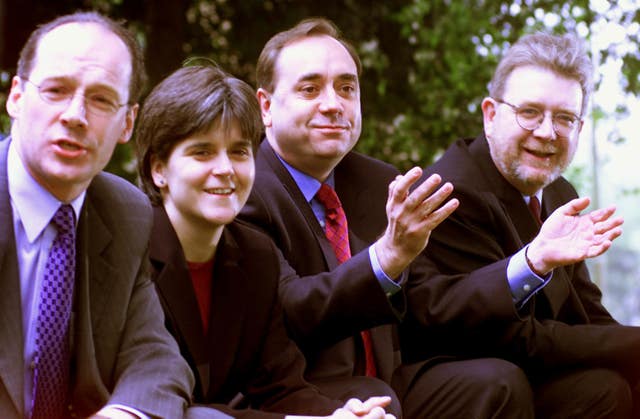
2004
– September 3
Ms Sturgeon is voted deputy leader of the SNP, with her mentor Alex Salmond re-taking the mantle of party leader.
2007
– May 17
The SNP wins the Holyrood election, forming a minority administration with Mr Salmond at its helm. Ms Sturgeon becomes Deputy First Minister, as well as being health secretary until 2012 and infrastructure secretary until 2014.
2012
– October 15
David Cameron and Alex Salmond sign the Edinburgh Agreement, setting the date for a referendum on Scottish independence for September 18 2014. Ms Sturgeon will play a leading role in the campaign.
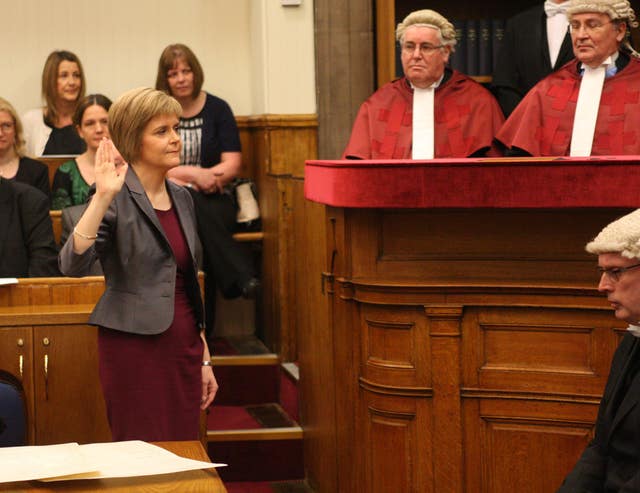
2014
– September 18
The Yes campaign loses the referendum by 55% to 45%. Alex Salmond resigns as First Minister the following day, with only Nicola Sturgeon tipped to replace him.
– November 14
Nicola Sturgeon is elected leader of the SNP unopposed. Stewart Hosie is elected as her deputy.
– November 19
Ms Sturgeon is elected First Minister in a Holyrood vote, the first woman to do so, thanks to the SNP majority won at the 2011 election.
She wins 66 votes, compared to Scottish Tory leader Ruth Davidson’s 15 and 39 abstentions.
– November 20
Nicola Sturgeon is sworn into office as First Minister at the Court of Session.
2015
– May 7
The SNP cruise to a historic landslide in the UK general election, just six months into the First Minister’s tenure, winning 56 of the 59 seats in Scotland.
Ahead of the election, Ms Sturgeon makes clear the vote is not about holding another referendum on Scottish independence.
2016
– May 5
The SNP slide back in the Holyrood election losing six seats and the party’s overall majority in the face of a surge for the Scottish Conservatives.
However, the party continues to be the largest in Parliament, with 63 MSPs, and continues as a minority Government.
The SNP will repeatedly seek help from the Scottish Greens to pass budgets and other key legislation.
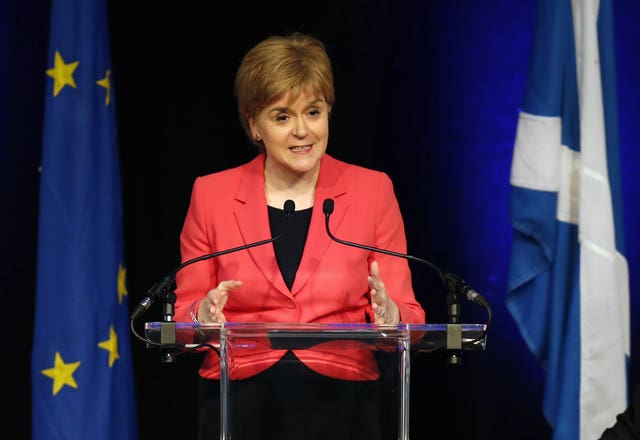
– June 23
The UK votes to leave the European Union in a referendum by 52% to 48%. Some 62% of Scottish voters supported remaining within the bloc.
Nicola Sturgeon, in a speech the following day, said there had been a “material change” in the circumstances within the UK and a second independence vote was “highly likely”.
2017
– March 28
The Scottish Parliament votes by 69 to 59 to allow the Scottish Government to begin talks on a Section 30 order, which would devolve the powers to hold another vote to Holyrood.
Then prime minister Theresa May, in the first of a long line of rejections on the issue, says “now is not the time” for another vote.
– June 8
SNP drop 21 seats in the 2019 General Election, falling to 35 MPs, on a manifesto calling for an independence referendum to be held “after the Brexit process”.
– June 27
Due to the election result, Ms Sturgeon tells MSPs she will put planning for another vote on hold, claiming some Scots “just want a break from the pressure of making big political decisions”.
2018
– January
Two female staff members make formal complaints to the Scottish Government about Alex Salmond’s conduct in December 2013 when he was first minister.
An internal investigation is established and investigating officer Judith Mackinnon is appointed.
– March 7
The Permanent Secretary tells Mr Salmond about the investigation.
– March 29
Mr Salmond’s former chief of staff, Geoff Aberdein, meets Ms Sturgeon at Holyrood and discusses the allegations.
In her written evidence to the committee investigating the handling of the complaints in 2020, Ms Sturgeon says she forgot about this meeting until “late January/early February” 2019.
– April 2
Mr Salmond meets Ms Sturgeon at her home in Glasgow and tells her that he is under investigation.
In Mr Salmond’s later written evidence to a Holyrood inquiry on the matter, he states the First Minister “suggested that she would intervene in favour of a mediation process at an appropriate stage” but subsequently decided against intervening.
Ms Sturgeon has argued she thought this was a party meeting, rather than a Government one.
– June 7
Ms Sturgeon meets Mr Salmond in Aberdeen, ahead of the SNP conference.
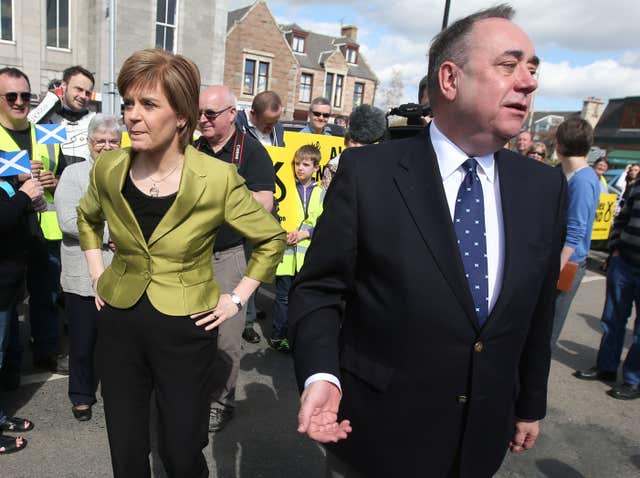
– August 21
The Crown Office passes complaints about Mr Salmond to police.
– August 23
The Daily Record newspaper breaks news of the allegations against Mr Salmond in a tweet.
– August 28
Mr Salmond lodges a petition for a judicial review at the Court of Session in Edinburgh.
– September 14
Police confirm they have launched an investigation into the complaints against Mr Salmond, separate from the Government’s investigation and the judicial review process.
2019
– January 8
A week before the full judicial review is due to start, the Scottish Government concedes defeat at the Court of Session in Edinburgh.
The Government’s lawyers accept that investigating officer Ms Mackinnon has had previous contact with the complainers.
The court concludes the investigation was therefore “unlawful” and “tainted by apparent bias”.
Mr Salmond is awarded more than £500,000 as a result of the ruling.
– January 13
Ms Sturgeon refers herself to independent advisers to rule on whether she breached the ministerial code in her meetings with Mr Salmond.
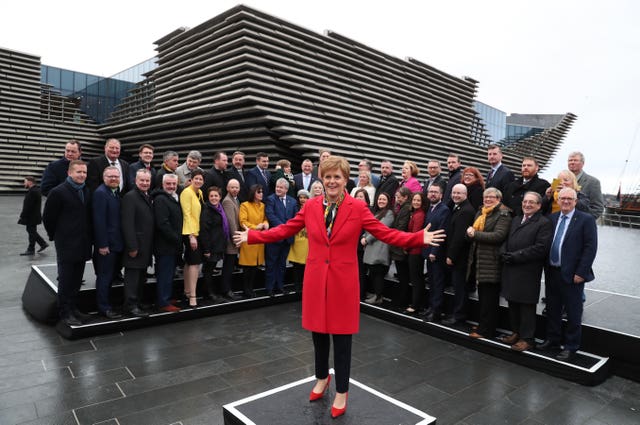
– December 12
The SNP vote rebounds in 2019 General Election, returning 48 MPs.
The success results in the First Minister ramping up calls for another independence referendum.
2020
– March 1
Scotland records its first case of Covid-19 in Tayside.
– March 9
Mr Salmond’s criminal trial starts at the High Court in Edinburgh.
– March 23
Ms Sturgeon announces Scotland will be placed into lockdown as a result of the increasing coronavirus cases.
The country would spend most of the next two years under some kind of restriction as a result of the pandemic.
Mr Salmond was acquitted of all 13 charges at the High Court in Edinburgh.
– October 28
A report by Public Health Scotland shows that 113 people were discharged from hospital into care homes without receiving a negative test for the virus in the early part of the pandemic.
The First Minister said moving patients into care homes “was not found to have contributed to a significantly higher risk of an outbreak”.
– August 18
A Holyrood committee set up to investigate the handling of complaints against Mr Salmond that resulted in the pay-out – the Committee on the Scottish Government Handling of Harassment Complaints – hears evidence from its first witness, then permanent secretary Leslie Evans.
2021
– February 26
Mr Salmond gives evidence to the Holyrood committee.
He says Scotland’s “leadership has failed” and calls for the Lord Advocate and Ms Evans to resign over the handling of the complaints against him.
He says he has “no doubt” Ms Sturgeon broke rules governing the behaviour of ministers, which she denies, but stops short of saying she should resign.
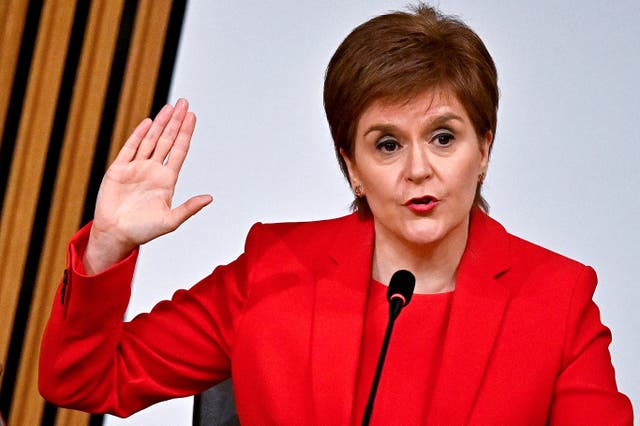
– March 3
Ms Sturgeon gives evidence to the committee and maintains she did not intervene in the investigation as it would have been an abuse of her role.
She said Mr Salmond’s claims of a plot against him are “absurd” and her Government has nothing to hide.
– March 22
An independent report by judge James Hamilton QC clears the First Minister of breaching the ministerial code following the Government’s botched handling of allegations against Mr Salmond.
– March 23
The Committee on the Scottish Government Handling of Harassment Complaints finds Ms Sturgeon misled MSPs while giving evidence.
It says there was a “fundamental contradiction” in her evidence on whether she agreed to intervene in a Scottish Government investigation into complaints by two women against the former first minister.
Ms Sturgeon survives a vote of no confidence, brought by the Scottish Tories, who claimed she misled Parliament and ignored legal advice.
The vote fell by 65 votes to 31 with 27 abstentions.
– April 14
Scotland surpasses 10,000 deaths linked to the virus.
– May 6
SNP increases its share of MSPs to 64, still shy of a majority.
– May 26
First Minister announces she is in talks with the Scottish Greens over a potential agreement between the two parties.
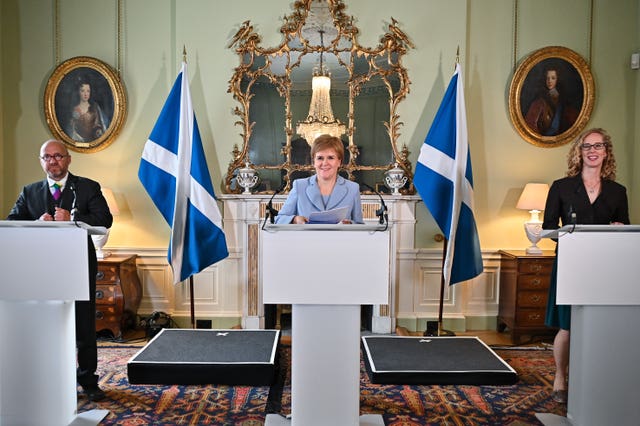
– August 20
The co-operation agreement between the two parties, solidifying the Scottish Government’s majority, is announced.
A shared policy platform is published, including exceptions where the two parties can disagree such as an independent Scotland’s membership of Nato.
Greens co-leaders Patrick Harvie and Lorna Slater become Scottish Government ministers.
– October 31
Cop26 opens in Glasgow. The First Minister was present at the conference for most of the two weeks, meeting with foreign dignitaries.
2022
– May 25
Nicola Sturgeon becomes the longest-serving First Minister in Scotland since devolution.


Comments: Our rules
We want our comments to be a lively and valuable part of our community - a place where readers can debate and engage with the most important local issues. The ability to comment on our stories is a privilege, not a right, however, and that privilege may be withdrawn if it is abused or misused.
Please report any comments that break our rules.
Read the rules here